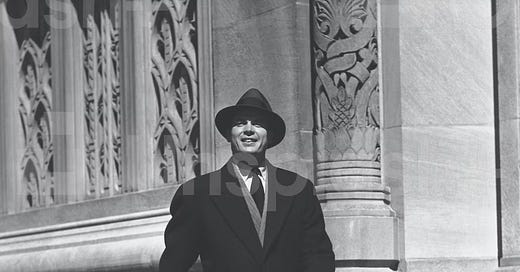Upon contemplation, I concluded that today’s message can best be shared via my analysis of “Overcoat”, a short story by Nikolai Gogol. For the benefit of the readers who are not familiar with the story or author, I will concisely summarize the story, so that the analysis reads more logically and meaningfully.
Summary
Akaky Akakievich was an insignificant man who was often bullied by his colleagues, who spent the bulk of their time in gossip, parties and emulating those who are superior to them. However, Akaky never paid attention to anyone or anything around him if they did not concern him personally; he was a content man and had no aspirations of elevating his present standing. This contentment however, somewhat resulted in his meager salary, which he did not mind, until the unforgiving weather proved his need to purchase a new overcoat, which he could not afford. When he eventually could, his popularity elevated, until unfortunately, his overcoat was stolen from him. Akaky’s circumstances were made worse when none of the Russian officers were eager to help him. In one instance, when seeking help from a personage, Akaky was harshly reprimanded and interrogated, to which Akaky was so petrified that he fainted, subsequently passing away. Consequently, Akaky became a ghost which haunted the same personage and many other Russian officers and citizens.
Analysis
Through “Overcoat”, Gogol conveys the necessity to listen to our conscience; the neglect of which will be punitive, as our conscience will grow to consume us. To present such a message, Gogol represents Akaky Akakievich as the conscience, which developed from being insignificant to feared; the Russian society as corrupt, such that impersonating the wealthy and feigning one’s significance were almost necessary; and the overcoat as a token of superiority, though often stolen and unearned.
That Akaky represents the conscience is suggested since the beginning: his impact on the “poor young man”, who bullied Akaky and later realized the “hidden savage brutality…in refined, cultured manners” of man, foreshadows Akaky’s growing influence as the conscience. Gogol uses this instance to hint at Akaky’s developing representation as the ultimate conscience.
Unfortunately, the presently insignificant conscience lived in a corrupt Russian society, where the majority’s focus revolved around nosiness and gossip (displaying “sly grins” upon noticing the imperfections of others’ appearance); bullying, like how they bullied Akaky; and affecting their superiority in parties. The claim of feigning one’s superiority is also evident in characters aside from Akaky’s colleagues, such as Petrovich (a tailor from whom Akaky purchased the new overcoat), a serf who adopted a noble name, yet possessed lower-class characteristics: vulgarity, lack of hygiene and the poor ability to verbally express himself. The “significant personage” similarly supports this supposition through his habit of affecting his “significance”. Even more unfortunately, the extent of corruption in the Russian society was so great that being in favor of the unproductive majority was obligatory. This notion is reflected through Akaky’s eventual need to purchase a new overcoat due to the unforgiving Russian weather. Gogol employs Akaky’s inability to remain constant to suggest that imitating the majority was inevitable. What made Akaky stand out from others however, was that he earned his token of superiority (the overcoat) not by feigning his significance, but through toiling honestly and forthrightly–saving up money and depriving himself.
Upon earning an overcoat, Akaky was rendered sufficiently qualified to attend parties, signifying the necessity of possessing social capital to mingle with the majority. Nevertheless, Akaky’s overcoat was quickly stolen, reinforcing the notion that the Russian society was corrupt, not favoring the deserved. It was also this point however, that Gogol presents his primary message: we must listen to our conscience. Gogol does this by presenting how Akaky’s role as the conscience aggrandized: Akaky became the prominent apparition to frighten the dishonorable Russian citizens and to seek his overcoat–his earned token of superiority. This is supported when Akaky frightened the “significant personage”: the personage had “heard rebukes from his conscience…all day” but failed to pay attention to it, resulting in his conscience growing big enough to scare him, in the form of Akaky’s ghost. After amending his undesirable behaviors and returning his unearned overcoat to Akaky, who did earn his deserved tokens (overcoat), “the clerk-corpse ceased entirely”. A similar piece of supporting evidence is also found at the end when Akaky scared a policeman by changing from a regular-sized ghost, to “a much bigger one”. These instances present the need to listen to our conscience, or it would grow to haunt us ceaselessly, until we decide to listen to it.
Final thoughts
Every day, we form thoughts, articulate words and carry out behaviors; each of which is quickly accompanied by a feeling in our heart—positive, negative or a combination. That is the manifestation of our conscience. I have learnt that the more you listen to it, the more regulated your life will be, for the conscience is extremely sensitive and quick to nudge us when we make an idiotic decision. One can attempt to ignore one’s conscience, but only to no avail: it will eventually grow like Akaky’s ghost did, scaring us ceaselessly so that we are unable to bear the ensuing anxiety, depressive symptoms, guilt and contrition.
Be intent, alert, observant and sensitive.
Listen to your conscience.
(P.S. I am aware of the exceptions where one can go too far in listening to one’s conscience, but I can only discuss so much in a distilled article.)



